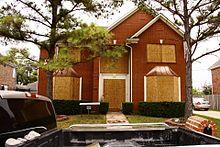Boarding up is the process of installing boards on the windows and doors of a property to protect it from storm damage,[1] to protect unused, vacant, or abandoned property, and/or to prevent unauthorized access by squatters, looters or vandals.[2]
Plywood sheets are usually used for this but an alternative is plastic sheeting. Specialists use 32-foot rolls of tough plastic for this and are able to wrap a complete house in 90 minutes. This has the advantage of waterproofing storm-damaged property but will not protect it from looters or squatters as the plastic may be cut.[3]
While short-term boarding up is associated with protection from storms or in case of a broken window, long-term boarding up is most often associated with unoccupied buildings, and may form part of property preservation of foreclosed properties.
References
- ^ P Fronstin, AG Holtmann (1994), "The determinants of residential property damage caused by Hurricane Andrew", Southern Economic Journal, Southern Economic Association, 61 (2): 387–397, doi:10.2307/1059986, JSTOR 1059986
- ^ Stewart Kidd (5 July 1996), Reuse of Empty Buildings (PDF)
- ^ All Wrapped Up, Popular Science, February 1995, p. 41
- United States Fire Administration (29 November 1999). "Board Up Procedures" (PDF).
- Federal Emergency Management Agency. "Hurricanes". Are You Ready?. Archived from the original on 29 June 2006.
